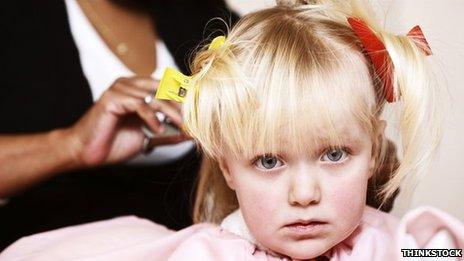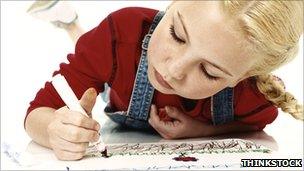A Point of View: Modern parenting
- Published
- comments

Today's children might appear mollycoddled compared with previous generations - but such pampering is more hard-nosed than it appears, says Alain de Botton.
Anyone who has observed a certain kind of liberal, concerned, modern parent at close quarters, and doesn't have children of his or her own, is likely to come away from the experience appalled.
The care and attention paid to every detail of the child's life is terrifying. Simply deciding what one might have for dinner can take hours of careful negotiation.
Every question a child raises is accorded infinite care - how long would it take to fall through the earth, from one end to the other? Does Daddy know that the okapi is a relative of the giraffe even though it looks much more like a horse or zebra? Where does wind come from? Who were the most powerful people in Victorian England? What is inside an atom?
Historians tell us that for much of human history, these questions would have received short shrift. There was a high chance your small questioner was going to be dead by adulthood, you might have five or six similar-sized creatures to put to bed every night, and it therefore felt logical not to invest too much energy and emotion in providing any one of them with answers.

Unlike in bygone times, the child is at the centre of the modern family
In any case, the questions that children thought up were of no particular importance to begin with; the whole of childhood was conceived of as a dreamlike phase substantially disconnected from any of the major determinants of adult existence.
Yet we now live in a society and era for whom it is a basic axiom that the success or failure of grown-up life is directly tied to the quality of the care one receives in childhood.
Beneath the surface activities of the family, the games of hide and seek and the baking of biscuits, the trips to the zoo and the colouring of Tyrannosaurus Rex's scales, personalities are being assembled upon whose strength and creativity all subsequent flourishing will depend. Emotional lessons that are not properly learnt at the toddler stage will never be fixed or only at great and slow therapeutic cost.
The television networks are too full of people tearfully evoking memories of maternal or paternal neglect or misunderstanding, not to make it plain that being somebody's parent is not an occupation to fail at lightly. The job means that one is daily attending - in the most seemingly innocent moments, when responding to a school project or appraising a Lego airport - to the casting of foundations no less sensitive and load-bearing than those of a skyscraper.
It seems that the people who bring us into the world have to stand back and admire their creations with deep bias.
Otherwise, decades later, when someone tells us they love us, we will lack a capacity to believe them and will cruelly punish them for displaying a faith in us that we lack in ourselves.
Otherwise, we will crave external approval and never be able to make daring choices, out of an inability to tolerate even a momentary absence of applause. Otherwise, even if we do accomplish great things, we will never feel that we deserve to exist. We will go to sleep tearful and anxious, distraught that we were not properly loved 30 or 40 years back.
This may seem like an insultingly vulnerable account of our functioning, but it cannot be untrue on this basis alone; we are also creatures who can keel over and die from a blood clot less than half a millimetre in diameter.
This modern philosophy of childhood makes everything meaningful. Little Johnny is not just being annoying when he piles up cushions in the living room, declares himself to be a shipwrecked sailor and calls out for help from marauding sharks and scorpions. He is exploring contrasting ideas of helplessness and resilience that will in later years help him to overcome romantic rejection and take advantage of professional opportunities.
It looks like weakness and molly-coddling. It looks like decadence.
To an outsider, especially of an older generation, there risks being something nauseous in all this care, in the patient parental questions as to how many fish fingers the young royals might want, the urgent ministration to their every bruise, the treatment of children as though their opinions mattered as much of those of people 30 years older than they, the decision not to go to a bookshop for fear of boring one's charges or to drive them another few miles just in order to get them a special kind of strawberry milk their palates prefer.
But though all this looks like softness, there is a hard-headed logic at work.

In an age where creativity counts, parents encourage artistic offspring
Just like parents of all ages and places, modern parents remain interested in ensuring their off-spring's survival, it is just that they now operate with very different assumptions about what survival will entail.
One can no longer necessarily thrive just by learning how to be dutiful and obedient and by practising the old arts of submission and deference. What counts in the new economy are qualities of confidence, creativity and originality.
These are the equivalents in our own day of what large muscles had been in ancient Sparta or a restrained stoic manner in Frederick the Great's Prussia.
There is no shortage of raw intelligence. What one needs on top of this is a mind that could make connections between ideas, that can persuade and cajole others into buying one's visions, that is capable of a grandeur of aspiration, and a psychological plasticity to deal with rejection - and this is why so much patience is, across the land, being devoted to the children's drawings of butterflies, such great care taken over their evening menus and such deep respect proffered for their minor insights and opinions.
These worries seem like ways of trying to contain an otherwise immeasurable panic at the sheer audacity of having dared to put a creature onto this troubled earth.
So long as a child goes to bed at exactly 1915, and learns how to tie up his shoelaces, and always says, "Thank you" after someone pours him a drink, the underlying hope is that he might miraculously avoid having to taste the ordinary cup of human sorrow.
The disproportionate nature of modern parental concerns has a way of coming to the fore at the beginning of every school day, when 20 or 30 adults gather in a classroom and bid their precious charges farewell.
To an outsider, it is evident that life simply cannot reward the hopes that rest on all these young shoulders - they are not going to avoid divorces, prostate cancers, addictions and depressions even if they are on track to get a golden star and a chance to read out their poem in assembly.
The children might master algebra, draw amoebas, write touching stories about their holidays and memorise the capitals of the world from Wellington to La Paz and still not have done anything to protect themselves against the devil's armoury of problems.
Not even studying Mandarin on weekends, practising the violin or doing extra chess will solve the issue. So much can go right and still we can count on being undone by the inescapable flaws of our temperaments and our surroundings, an untidy thought that the educational and parental apparatus tries desperately to keep at bay.
Yet that's no argument for not trying. It seems we cannot spontaneously feel important enough to ourselves, sufficiently worthy of carrying our absurd figure through the tangles of life, unless at some point - at around the time when we were still interested in reading Enid Blyton - we were privileged enough to derive a sense of mattering limitlessly and inordinately to another person.